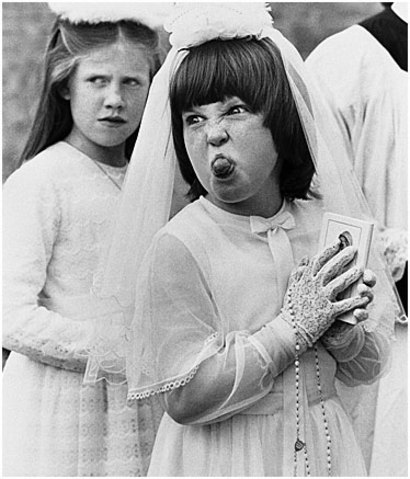Jn 9:41
“We are saved by those we despise.” –Pope St Gregory the Great
“Sit down! Shut up! And let me tell you about the love of God!” -old catechetical joke
“God loves you, and you’re going to Hell!” -another old catechetical joke
aka, Taliban/ISIS Catholics
“Here comes everybody!” – James Joyce, Finnegans Wake, 1923, about the Catholic Church
“I once had an argument with a non-Christian friend about a point of Christian apologetics. I thought I came off pretty well in the debate, and I was hoping my friend would concede the point. Instead, he said something I was not expecting. “But Dave,” he said, “I just don’t like Christians.” Ouch! Truth is a lot less persuasive if you can’t stand the person delivering it.
I hear this a lot in my work with non-Catholics. I sometimes ask, “What is keeping you from becoming a Catholic?” Not infrequently they answer, “Catholics. Catholics are my biggest obstacle to becoming Catholic.” I am reminded of what Mahatma Gandhi said, “I like your Christ. I don’t like your Christians.” (little hand raise) This is something the Holy Father, Pope Francis, has also spoken about. In a Wednesday audience (October 29, 2014), he complained about mean Catholics: “if this or that person is a Christian,” someone might say, “then I shall become an atheist.”
So what should we do about the problem of mean Catholics? One option, historically, has been Puritanism. Puritans are those who are sure they know who the “real” Christians are. They reject everyone else. In colonial New England, for example, Puritans wouldn’t let you receive the sacraments, or become a minister or even vote in civil elections or run for office if you couldn’t “prove” you were one of the “real” Christians. Puritanism is attractive because it seems to solve the problem of bad Christians. We write them off as “not really Christian” and withdraw into our sect.
But Puritanism doesn’t work. New England Puritans from the very beginning split up into factions, each one sure they were the “real Christians” and that everyone else was a mere pretender. Puritanism is also unfaithful to the teaching of Jesus. In the parable of the tares, the Lord teaches there are good and bad in the Church. “Let them grow together until the harvest,” he said. (Matthew 13: 24-30)
We must avoid Puritanism, furthermore, because we can make mistakes about who the “good” and “bad” Catholics really are. It’s very easy to think the “good Catholics” are those we feel comfortable with, those who look or sound like us. But the best Catholics may be the ones who go unnoticed, like the poor widow in the gospel. “Do you see this poor widow,” Jesus said, “She put in more than all the rest.” (Luke 21:3)
We may also misjudge who is really mean or bad. In 1944, the Anglican theologian and lay apologist C.S. Lewis gave an address called “The Inner Ring.” He pointed out that in most organizations or societies there are confidential discussions, unofficial hierarchies, and intimate circles that exclude us. One of our strongest temptations is to resent that exclusion, even when it is perfectly innocent. Sometimes we may call someone “mean,” simply because we envy their friends or influence.
But I don’t deny that there are truly “mean” people in the church. There are the self-absorbed, the narcissistic, and the materialistic. There are also the cocky, doctrinaire, holier-than-thou Pharisees. Jesus told us to expect this. We find both types even among his disciples. (Judas was a money grubber and a traitor. James and John could be unforgiving and censorious.)
So, again, what do we do? The solution is to remember why Christ founded the Church. The Church is not an exclusive social club for saints. It’s a hospital for sinners. The whole liturgical and sacramental system of the Church presumes that we will sin against each other. “If you remember your brother has something against you, leave your gift at the altar and be reconciled to your brother.” (Matthew 5:23) “Forgive us our trespasses as we forgive those who trespass against us.” “I confess to almighty God, and to you my brothers and sisters. . . “
The truth is we need our sinful, mean, fellow Catholics. The Church is supposed to be like a sacrament, a sign and instrument of union between God and neighbor. We are supposed to show the world how to forgive, how to overcome differences, how to “bear all things, believe all things, hope all things, endure all things.” (1 Corinthians 13:7) If everyone were beautiful and easy, what kind of heroic charity would we need? Like in marriage, we enter the Church starry-eyed and full of wonder. But reality sets in eventually and the work begins. “But the one who stands firm to the end will be saved.” (Matthew 24:13)
I went to Mass recently with a friend who complained to me, “These aren’t my people. I don’t have anything in common with them.” Exactly. Where else can you find a bunch of people (some nice, some mean), thrown together, with nothing in common, but pledged to get along no matter what. Jesus gives us the example. As St. Paul once said, “For a good man, someone might dare to die. But God showed His love for us in this, that while we were yet sinners, Christ died for us.” (Romans 5:8)”
Maybe, the New Evangelization is not about so much convincing others of our point of view, but rather, a personal call to self-reform?
Mt 7:3-5, Lk 6:41-42
Love,
Matthew


